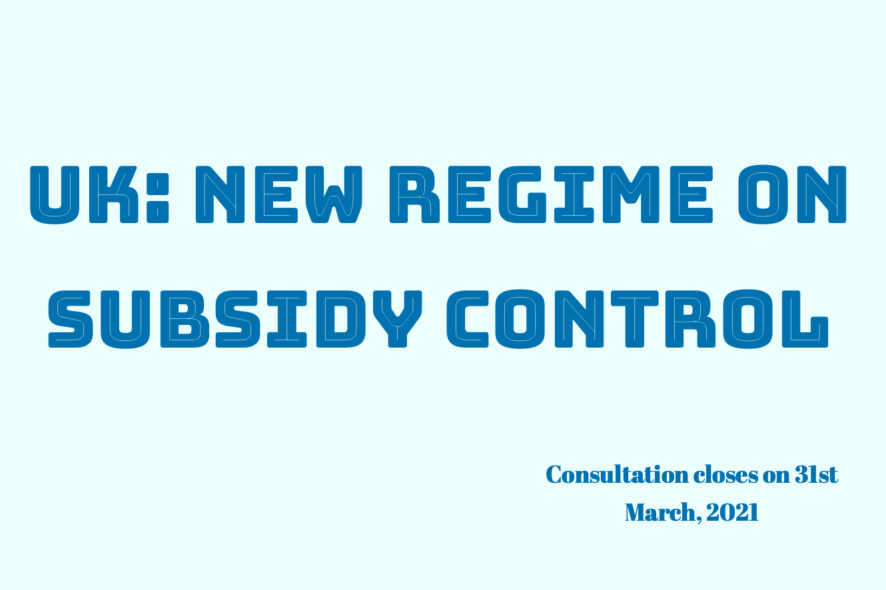With the advent end of transition period on 31st December, 2020, following the exit of UK from EU, the UK Government’s Department for Business, Energy & Industrial Strategy announced to consult on the creation of a new national subsidy control system on 3rd February, 2021[1]. This is the Consultation[2] as State Aid Rules were one of the three final issues that held up the agreement of the EU-UK Trade and Cooperation Agreement (TCA).
The Government seeks views from businesses and business representative organisations, subsidy granters, legal advisers and all other parties interested in subsidy control. Alongside digital responses, the Government intends to hold stakeholder engagement events on a number of topics during the consultation period. The Consultation[3] consists of three chapters, setting out the options available to the UK to design a bespoke subsidy control regime.
According to the Secretary for State for Business, Energy and Industrial Strategy:
“This consultation sets out the future of the UK’s subsidy control regime – a regime that will set out a clear and transparent set of principles and guidelines, ensuring that public authorities at all levels of government fully understand their legal obligations, and which will allow businesses to make long-term investment decisions on that basis.”
BACKGROUND
The introduction of this Consultation invites views on the best ways to design the new subsidy control regime fulfilling the international obligations of UK with respect to World Trade Organisation (WTO), Free Trade Agreements (FTA), UK- EU Trade and Co-operation Agreement and the Protocol of Ireland and the withdrawal agreement. Subject to the outcomes of this consultation, the Government will bring forward a primary legislation to establish a system of subsidy control that works for the whole of the UK. Subsidies are administered by all levels of government in the UK. The Government stresses that the new Regime, while encouraging the local authorities and administrations to take localized decisions, must avoid subsidy races which might distort competition between the UK nations.
Salient Features of the Consultation:
The Consultation consists of 43 questions dealing across a range of areas. The key topics referred are hereinbelow:
- The Government considers that there are four key characteristics of a subsidy. A support measure must meet all of these to be classified as a subsidy for the purposes of any regime:
-
- It must constitute a financial contribution provided by a ‘public authority’, including, but not limited to, central, devolved, regional or local government or any other person providing financial assistance originating from public resources.
- The award of the subsidy must confer a benefit on persons supplying goods or services in the course of a business, which would not be available under commercial terms.
- The subsidy must be specific which means it benefits a particular enterprise, or enterprises in a particular sector, industry, or region.
- It has to keep in mind that the UK subsidies are in line with UK-EU TCA.
- The Government provides various principles to be kept in mind while designing the new regime and seek views on whether there should be any additional principles to be considered also what information would be helpful to public authorities in order to consider effectively their compliance with the principles.
- The Government is seeking views on the proposal to introduce exemptions to ensure for the lowest risk and most time-critical subsidies can proceed quickly. Proposed exemptions are :
-
- Small amounts of financial assistance.
- Relief to compensate for exceptional occurrences.
- Services of Public Economic Interest.
- Temporary subsidies to address a national or global economic emergency.
- The Government further proposes to prohibit certain forms of subsidy. These include:
-
- Export subsidies, which are conditional on the exporting performance of the recipient.
- Subsidies contingent upon the use of domestic over imported goods or services. These types of subsidy are also prohibited under the WTO ASCM for goods.
- Subsidies in the form of unlimited state guarantees to enterprises.
- Subsidies granted to “ailing or insolvent enterprises”, where there is no credible restructuring plan to restore the business in question to long-term profitability will be prohibited.
- The Government proposes to make the following subsidies subject to conditions:
-
- Restructuring subsidies for certain financial institutions such as banks may only be allowed in specific circumstances.
- Subsidies granted to an air carrier for the operation of routes.
- Subsidies granted in the context of large cross-border or international cooperation projects.
- The Government intends to protect the UK’s internal market. The Consultation proposes to have a flexible system that empowers public authorities to design and award subsidies that bring benefits for society whilst providing clarity and certainty to both subsidy givers and recipients.
- The Government seeks views on whether specific categories of subsidies (such as for disadvantaged areas, R&D, transport, and skills investment) would benefit from tailored provisions, including whether the areas in the non-binding TCA declaration should be covered and whether any additional sectors or categories should be considered and, if so, the nature and extent of those provisions.
The Consultation closes on 31st March, 2021.
*Tanvi Singh, Editorial Assistant has put this story together
[1] Press Release, Business Secretary sets out new subsidies system that works for the UK. <https://www.gov.uk/government/news/business-secretary-sets-out-new-subsidies-system-that-works-for-the-uk>
[2] <https://assets.publishing.service.gov.uk/government/uploads/system/uploads/attachment_data/file/957958/subsidy-control-consultation-document.pdf>
[3] Supra.


